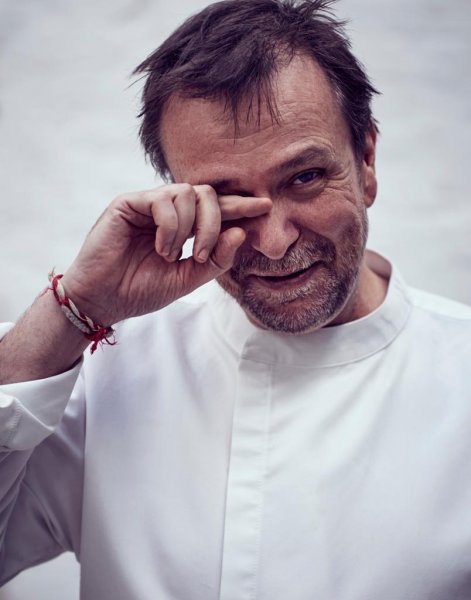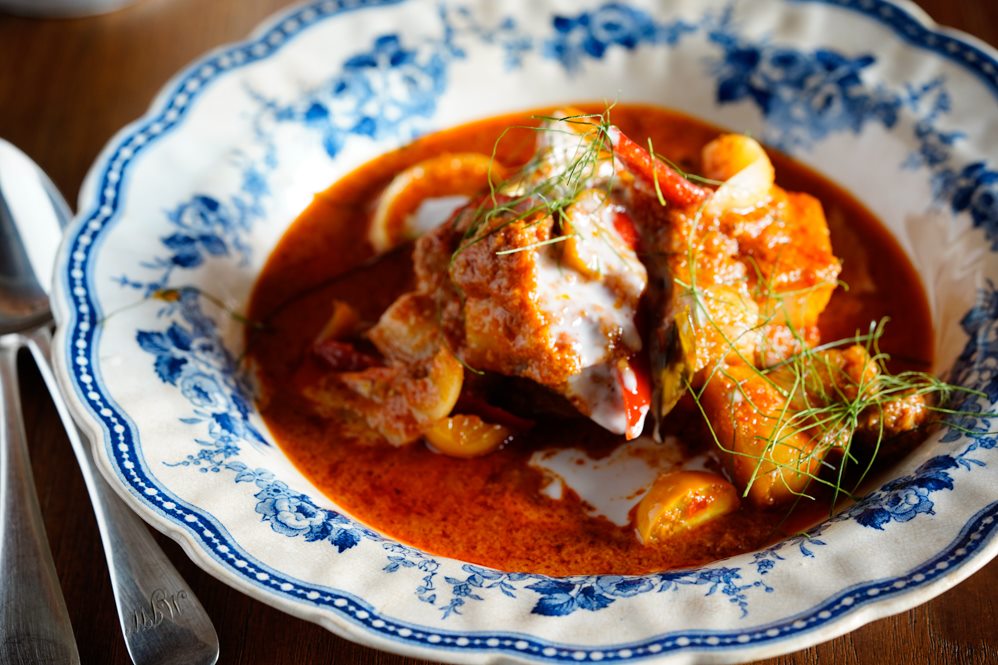Known as the chef and author who redefined Thai fine dining abroad, David Thompson is now back to beloved Bangkok and says, this time, it’s for the long haul.
After a surprise exit from his award-winning Nahm and sporadic restaurant openings in Australia, Samui, and Hong Kong; the Australian restaurateur has returned with a brand-new project, Aksorn, which recently opened atop five-story shophouse Central: The Original Store.
We sat down with the ever-articulate, smooth-talking chef to hear why everyone should leave their Nahm expectations behind, what it’s like to commune with the dead, and why beef in Thailand has never been better.
Were you always planning to return to Bangkok or did COVID-19 hamper your plans?
Well, I’ve always lived here, but Aksorn, along with my restaurants in Koh Samui and Krabi, have brought me back. COVID-19, of course, has me here for the long term. Aksorn was, in fact, already in the plans even before COVID-19 came to happen. [But] our restaurant reflects post-COVID necessities, such as the flexible rate, the size of the restaurant, and the relationships [with guests], which are now more intimate and controllable.
What’s the story behind Aksorn?
My ideas tend to happen sporadically — you can ask Dylan Jones [from Bo.lan] about that. When the proposal came around, I was very intrigued, as this building [of Central: The Original Store] originally was a bookstore downstairs, one that imported international titles, mostly magazines or fashion magazines, but interspersed with some decent novels and so on.
When the shop opened back in the 1950s, it was a time of tremendous transition … This area was the main hub of Bangkok’s entertainment and shopping area, to which this store held great interest by the elite, because they could find imported goods … I never really found this [period] very interesting. My focus was always on the 19th century and early 20th century. But I’m glad this place opened, because we can go through my old recipe books, try the recipes with the kids [the chefs], play with them, and then put the book back and choose another one.
What about the concept?
When this opportunity came up, as soon as I saw the building, as soon as I started to hear about the heritage, it seemed rather obvious, and I was instantly reminded of Books for Cooks—a cookbook shop and restaurant located in Blenheim, London – in that they would cook from cookbooks, for a month or two, in the back of the store.
[When the store opened back in the 1950s], people would buy or browse through cookbooks that dated from the ’40s, ’50s, and ’60s. Around that time [in Thailand], Western food had crept in and there was Chinese food and so on. It’s very interesting. You can taste [some of the old flavors] in some of our current dishes, like the terrine, for instance, and the ma hor.
Not all recipes [we’ve found from those cookbooks] are perfect. We had someone in just the other night who said that one recipe for a pork and banana dish should be forgotten, always forgotten, RIP. But there have been some outstanding ones as well.
The difficulty for us is to try and be like a chameleon and take on the taste of that early era, which is rather hard. I can get the ideas behind it, but it’s very hard to commune with the dead and check how it tastes. We can feel our way through many of the recipes, though.

Will you use the same cookbooks or continuously change?
I had intended initially to do one book every month, but with so many other commitments, doing so would make it… impossible for me to achieve with regularity. And because these books have hundreds of recipes, some of which are very cliche, like grilled chicken or panang curry. I disdain the cliches… and the conventional. I’m a bit more mature. But if you do classics well, it lifts it out of the cliche and then you understand why it’s a classic. And this is why we have to play it on the safe side, which restricts me enormously, because I want to appease living, and not just appease the dead. I also certainly have to be responsible… to maintain close connection to these recipes, otherwise I’m not representing them.
Seems like a lot of people invested in the food scene here are judging your new place based on what you produced at Nahm. How do you feel about that?
It would be a sad reflection on me if a restaurant from three years ago would be what I was doing now. Aksorn is entirely different. It is premised upon those books, and it’s me trying to draw upon those recipes and cook as they tried to cook back then as best as I can.
I quickly came to the realization that I couldn’t quite channel the dead, and, luckily, nor did they try to possess me, shake me out of my culinary lethargy, and condemn and curse me for doing them wrong. I also had to decide that sometimes I would have to change the recipes a little bit in order to please the living.
Every good cook has their own style. Every person sees [life] through the lens of their own experiences and interprets them accordingly. It’s the same with cooking. It’s very hard for me to subvert that.
One of the things that reassured me is when one guest simply said, “This is not like the food at Nahm.” This place is different from any restaurant I’ve done before. It’s not about me — it’s about the books and the cooks.

What are your thoughts on the current state of Thai fine dining?
One of the ironies, from what I can work out, is many of the upmarket Thai restaurants are not working as well as they did, which is a shame.
Do you think it has a chance of survival during these unpredictable times?
I sincerely hope so. I’m not sure that all of them will, because of tourism. Thai people eat street food or at home. I would love them to spend as much time as they would at an Italian restaurant or Chinese or French restaurants. It is the irony of Thailand: great Thai restaurants and retailers that are supported from abroad aren’t necessarily supported locally to the same extent. At Nahm, we were very lucky. I hope to be able to achieve that here, and that’s why I said this is a post-Covid restaurant — it’s much smaller and more adaptable, in many ways.
How has the produce available to you changed from when you first started cooking?
It’s wonderful. I don’t face any difficulty whatsoever. The only thing that I did find that was difficult was beef. Now, I’ve found a great beef supplier through Chalee Kader at 100 Mahaseth. [The quality of] produce in Thailand is at an all-time high.
What are your thoughts on the quality of street food from when you arrived in Thailand vs. now?
When I arrived in the 1980s, it was delicious and extraordinary. I can see that it has changed somewhat. There’s an evolution — some of it good, some of it not so good. There have been increasing costs without the commensurate increase in price. So they’ve got to squeeze somewhere. You can’t change your rent. You can’t change your staffing costs. But you can change the quality of food, and that’s unfortunate.
How do you feel about the accolade system this year? Should awards be going forth while many restaurants are closing?
Let’s put it this way: I don’t do things for the sake of awards or accolades. I do this because I believe in it. If I’m not interested in the project, well just don’t get me started.
Any other projects coming soon?
I do have a couple of projects coming soon, but you’ll have to wait a bit longer for the announcement.





Reader Interactions